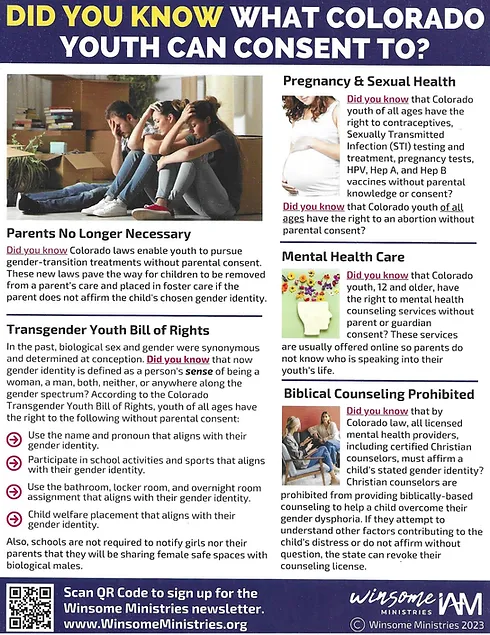Colorado’s Youth Rights: What Parents Need to Know
In Colorado, recent legislative changes have given minors unprecedented autonomy in making significant life decisions without parental consent. These laws encompass various areas, from gender identity to mental health and sexual health, fundamentally altering the traditional role of parents in guiding their children through these critical aspects of life. The implications of these changes are profound, raising essential questions about the balance between protecting a child’s rights and maintaining parental authority. This article explores the key areas where Colorado youth now have the legal right to make independent decisions and the potential consequences for families.
Gender-Transition Treatments Without Parental Consent
One of the most controversial aspects of Colorado’s new laws is the allowance for minors to pursue gender-transition treatments without the need for parental consent. This means that a child can access hormones, puberty blockers, and other transition-related healthcare without their parents’ knowledge or approval. The laws also empower the state to remove children from their parents’ care and place them in foster care if the parents do not affirm the child’s chosen gender identity. This shift in legal standards raises concerns about the erosion of parental rights and the potential psychological impact on children making such significant decisions at a young age.
The Colorado Transgender Youth Bill of Rights
The Colorado Transgender Youth Bill of Rights has redefined gender identity, which is no longer tied to biological sex. Instead, gender identity is now recognized as a personal sense of being a woman, a man, both, neither, or anywhere along the gender spectrum. This bill grants youth the right to use the name and pronoun that align with their gender identity, participate in school activities and sports according to their gender identity, and access bathrooms, locker rooms, and overnight accommodations that match their gender identity. These rights are granted without requiring parental consent or even notification, which could lead to situations where parents are unaware of significant changes in their child’s life.
Privacy Concerns and School Policies
Under the new laws, schools are not required to inform parents if their daughters will be sharing private spaces like bathrooms and locker rooms with biological males who identify as female. This policy has sparked debates about privacy and safety, especially for young girls who may feel uncomfortable or unsafe in these situations. The lack of transparency between schools and parents regarding such policies further complicates the issue, leaving many parents in the dark about what their children are experiencing at school. The broader implications for student privacy and parental rights continue to be a significant concern.
Youth Autonomy in Sexual Health Decisions
In Colorado, minors of all ages have the right to make decisions regarding their sexual health without parental consent. This includes access to contraceptives, STI testing and treatment, pregnancy tests, and vaccines for HPV, Hepatitis A, and Hepatitis B. Additionally, Colorado youth have the legal right to obtain an abortion without parental consent. While these laws are intended to empower youth and provide them with necessary healthcare, they also remove parents from critical conversations about sexual health, potentially leading to situations where children make life-altering decisions without the guidance and support of their parents.
Mental Health Care Without Parental Involvement
Another significant area where Colorado law grants minors independence is in accessing mental health care. Children as young as 12 can seek mental health counseling services without their parents’ consent. These services are often provided online, which means that parents may have no knowledge of who is influencing their child’s mental health decisions. While this autonomy is designed to ensure that children can access help when they need it, it also raises questions about the potential for outside influences that may not align with the family’s values or beliefs. The absence of parental involvement in these situations can lead to a disconnect between parents and children during critical moments of a child’s development.
Restrictions on Biblical Counseling
Colorado law also places restrictions on the type of counseling that licensed mental health providers, including Christian counselors, can offer to minors. Counselors are legally required to affirm a child’s stated gender identity and are prohibited from providing biblically-based counseling aimed at addressing gender dysphoria through a faith-based perspective. Failure to comply with these regulations can result in the loss of a counseling license. This legal framework limits the options available to parents who seek faith-based counseling for their children, potentially forcing them to choose between their religious beliefs and state regulations.
The Impact on Parental Authority
These laws represent a significant shift in the balance of power between parents and the state. By granting minors the right to make decisions about their gender identity, sexual health, and mental health without parental consent, Colorado has effectively diminished the role of parents in guiding their children’s development. This shift has far-reaching implications, potentially leading to conflicts between parents and children, as well as between parents and the state. The erosion of parental authority may also contribute to a growing sense of disconnection within families, as parents struggle to remain involved in their children’s lives.
Navigating the New Legal Landscape
For parents in Colorado, navigating this new legal landscape requires a proactive approach. Understanding the rights that have been granted to minors and the limitations placed on parental involvement is crucial. Parents may need to seek out new ways to engage with their children, fostering open communication and building trust to ensure that their children feel comfortable discussing these sensitive issues. Additionally, parents may want to stay informed about legal developments and seek support from community organizations that align with their values to better advocate for their parental rights.
Conclusion: The Role of Parents in a Changing World
As Colorado continues to expand the rights of minors, the role of parents in their children’s lives is increasingly being challenged. While the intent behind these laws may be to empower youth, the consequences of excluding parents from critical decisions can be profound. Parents must remain vigilant, informed, and engaged to protect their rights and maintain a strong, supportive relationship with their children. In a world where the state plays an ever-growing role in the lives of families, the importance of parental involvement and guidance has never been more critical.

Author
-

Task Force Freedom Contributor Brother K is an outspoken defender of moral integrity in education, focusing on uncovering the societal threats posed by radical ideologies in schools. With years of experience in activism, Brother K’s articles on Task Force Freedom aim to inform and empower parents to take a stand against dangerous influences affecting their children. His commitment to exposing harmful practices and advocating for family-centered values makes him a powerful force for change. Brother K’s anonymity is a reflection of his focus on the cause rather than personal recognition, as he continues to fight for the rights of families across the nation.
View all posts



